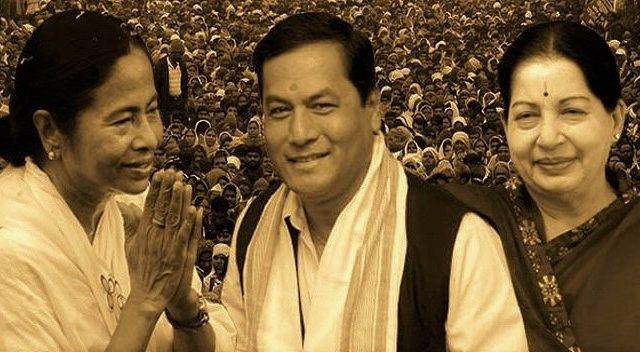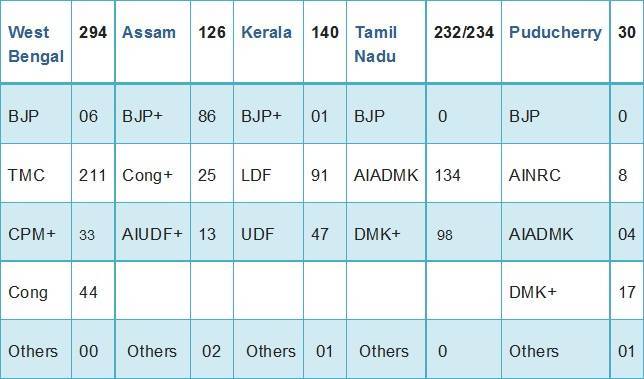Indian Voters Gamble: 2 Queens and a Wild Card

“what each successive election seems to reinforce is that India’s oldest party is no longer a contender even as the lead opposition player; instead, it will be up to an arrangement of regional leaders like Mamata Banerjee, J Jayalalithaa and Nitish Kumar to counter the BJP for the next national election in 2019.”
INDIAN STATE ASSEMBLY RESULTS
With the final tallies being made, Mamata Banerjee and Jayalalithaa, the two demagogic female Chief Ministers of the Indian states of West Bengal and Tamil Nadu, virtually queens in their respective dominions, were vindicated at the polls on May 19th. Both leaders are controversial and their administrations have been riddled with scandal. Their re-elections occurred as the BJP smashed the congress monopoly in Assam – but not without playing the risky wild card of identity politics.
In West Bengal, arrests within Banerjee’s Trinamool Congress Party (TMC) in the investigation of India’s largest Ponzi scheme, hasn’t impacted electoral math much. Her ruling government is poised to expand their majority after the counting is done, though the jailed former Minister and close associate of Banerjee’s, Madan Mitra, has lost his seat. The TMC was also rocked by a bribery scandal in March, just before voting began. However, of the six MLAs implicated, five were re-elected. Corruption and graft, it would seem, offers little impediment at the polls in the state.
The Congress-CPM alliance, which had formed in opposition to the TMC, has proven to be a mistake for Congress and an utter disaster for the CPM. In victory, Banerjee punctuated this in typical language: “Congress has done a blunder by tying up with the Left, the alliance was a political blunder… There were all sorts of alliances against us,” she said. “But people have ultimately made their choice.”
Banerjee repeated the as yet unfulfilled promise to return land acquired by the state when the CPM was in power though no legal avenue exists to do so. “Singur land will be returned,” she said.
Reputed Indian daily, The Hindu, called the mandate a landslide. Banerjee was one of the first to agree. “This is for the first time in 49 years that such a massive mandate has been given to a single party,” said Banerjee, whose party hopes to win a previously thought of as improbable 212 seats.
With Jayalalithaa-led AIADMK set to win Tamil Nadu for a straight second term nearly decimating all other opposition, the South Indian icon was elated: : “There are not enough words in dictionary to adequately express my feelings of gratitude to the people of Tamil Nadu,” she said.
The AIADMK’s performance has rubbished exit poll predictions, which had tipped the DMK-Congress alliance to come to power.

BJP’S LOOK EAST POLICY WINS BIG
Narendra Modi’s Bharatiya Janata Party (BJP) had cause to celebrate, breaking the stranglehold of Congress over the Eastern State of Assam. Modi called the verdict historic and said that the party will do everything possible to fulfill the dreams and aspirations of the people of Assam.
“BJP will take the state’s development journey to new heights,” said the PM.
Exit polls had already indicated that Congress Chief Minister, Tarun Gogoi, who was seeking a fourth consecutive term in the state was in trouble. He was seeking his third consecutive re-election. For most of its history, Congress has dominated politics in the state winning the most number of seats in all prior elections but one.
Modi and his close associate, BJP President, Amit Shah expended considerable political capital in the state, leading many rallies along with alliance partners. It’s main partner, the Asom Gana Parishad (AGP) had been borne out of a six year agitation against illegal immigration from Bangladesh.
The BJP capitalized on identity politics, vowing to end illegal immigration even as the BJP central government had granted amnesty to illegals. The latter fact was underplayed with Hindus and demonstrated to Muslims that the right wing party was capable of being humane towards minority groups. Indeed, BJP Chief Ministerial candidate, Sarbananda Sonowal said that the BJP was not against legal Muslim immigration. Deeds at the centre seemed to back-up his statement, and may have carried considerable credibility among Muslim voters who are not the primary vote bank of any regional party.
Notwithstanding Modi and Shah’s campaigning, the regional party was careful to steer clear of national politics. Instead, they focused on the local leadership. Sonowal, the 53-year-old former president of influential All-Assam Students Union, who hails from the Kachari tribe, brings in a unique synthesis of tribal leadership and Hindutva politics in governance-starved Assam.
Sonowal’s ancestral link to the Kachari tribe of Assam was likely a key factor behind the BJP coming to power beyond the mighty Brahmaputra river, which separates the Sino-Nepali-Tibetan influenced Indic peoples of the North East from Hindi-dominated North India. Projection of Sonowal to the leadership of the state helped portray the BJP as a pro-tribal organization.
Regional politicking has always been risky as it can spur separatism. Only time will tell if the BJP’s gamble on Sonowal will pay off or whether he will prove to be a tribal wild card.
The BJP did well in Bengal, winning four seats without any coalition partner. This is an historic first for the Party. Modi had campaigned in the state, and put up high profile candidates in key constituencies including Netaji Subhas Chandra Bose’s grand-nephew, Chandra Kumar Bose against CM, Mamata Banerjee.
REVERSAL IN KERALA
Change was in the air in Kerala as well as Congress Chief Minister Oomen Chandy was ousted by the CPI(M) led Left Democratic Front (LDF). Leading or winning in 91 seats, the LDF is likely to hold a majority that is nearly twice that of the incumbent rival, Congress-led United Democratic Front (UDF). Though the change is something of going ‘back to the future’ in bringing back the old left guard to the state, it was a resounding negative referendum on Chandy’s Congress government.
CPM politburo member Pinarayi Vijayan said the UDF “trampled on values and its decadence had led to the rout”. Opposition leader V S Achuthanandan said the “failure of the Government to ensure the safety of women” was the major factor for the UDF defeat.
A shell-shocked Chandy said the defeat was never expected “but we accept the people’s verdict and resolve to go into reasons for the reversal”. Former Union Minister and popular Keralite Congressman tried to put a brave face on the loss, saying that Congress had made in-roads with young people, and the opposition will consist of people far younger than the government.
The author of Nehru: The Invention of India, said: “The Congress is reinventing itself as the party of young people.” With Tharoor being 60, himself, and failing to criticize the albatross of dynastic politics in his own party, many in the state saw his spin as ironic. Using Tharoor’s words against him when he said that the “BJP was unlikely to open its account in Kerala,” the Deccan chronicle noted that the BJP had done just that by winning a seat for the first time in history and coming in second in others.
Tharoor has long been seen to be close to Chandy who had defended him in the past, and who inaugurated Tharoor’s 2012 launch of the book, Pax Indica: India and the World of the 21st Century. Tharoor’s Lok Sabha victory, bucking the anti-Congress trend, was viewed by the Economic Times as strengthening Chandy’s government at the time.
Chandy had dared the voters then to regard the general election as a referendum on his government. Tharoor, in turn campaigned hard for the state Congress party in 37 constituencies in the assembly polls. Did it follow that, this time, the assembly polls should be seen as a referendum on Nehru-Gandhi’s Congress party at the Centre? Tharoor urged the public not to take this position.
“All state elections are not a referendum on national leadership, there are local issues involved,” remarked Tharoor, reflecting the traditional Congress refusal to question the Nehru-Gandhi dynasty as the foundation of the party.
Rahul Gandhi, Congress Vice President, tweeted that he accepts the people’s verdict with all humility and will focus on improvement. Under his leadership, the Congress slid in the 2014 general election to its worst-ever performance, and has lost in all but one state contest. Despite this, incredibly (or perhaps indicative of the deeply sycophantic nature of the party) some Congressmen went so far as to use the humiliating losses as an occasion to fervently demand that the forty-five year old party VP be promoted to the post of president.
“The process of his elevation cannot be stopped, he will be president” said Congress leader PC Chacko.
In 2014, the Congress did not name Gandhi as its prime ministerial candidate, but he led the campaign that scored the party’s worst ever national showing. He’d never held a ministerial portfolio in any government, instead being tasked with ‘building the party’ at a grass-roots level. This too, seems to have been a resounding failure.
NDTV analysts, remarked that, “Congress’ win in Puducherry today with the DMK apart, what each successive election seems to reinforce is that India’s oldest party is no longer a contender even as the lead opposition player; instead, it will be up to an arrangement of regional leaders like Mamata Banerjee, J Jayalalithaa and Nitish Kumar to counter the BJP for the next national election in 2019.”
 The Global Calcuttan Magazine
The Global Calcuttan Magazine